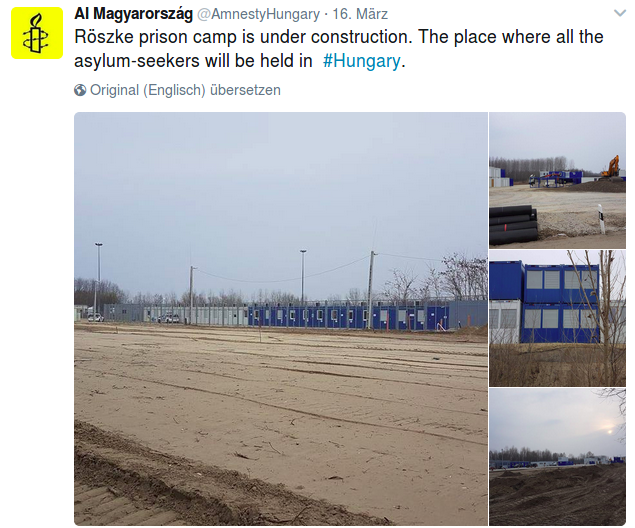The Helsinki Committee is attacking the reinforced legal border barrier – during the course of its overzealous activities it is attacking non-existent container prisons using faulty legal reasoning. In view of the fact that no decision has been made on transferring any migrants, there is nothing to suspend. Accordingly, the latest overzealous action by the Hungarian Helsinki Committee is clearly an unprincipled attempt to attack the reinforced legal border barrier that came into force today. The organisation is attacking the goals of the reinforced legal border barrier, that from today nobody will be able to enter the territory of Hungary and the European Union in an uncontrolled manner.
Alle Beiträge von ms
Orbáns Regierung sperrt Flüchtlinge in Containerdörfer
324 Wohncontainer, zwei Dörfer: Ungarn hält Flüchtlinge künftig in speziellen Lagern fest, bis über ihren Asylantrag entschieden ist. Das betrifft auch Minderjährige.
EU stands aside as Hungary detains migrants
The European Commission is sending experts to Hungary to address concerns about the country’s new asylum law that allows blanket detention of asylum seekers, but it will not launch any probes for now, it emerged on Tuesday.
Hungary Builds Four New Soldier Barracks To Strengthen Border Protection In The South
Hungary’s Defence Minister István Simicskó inaugurated new barracks in Hercegszántó, near Hungary’s southern border, that will house soldiers carrying out border protection duties there. The facility opened on Monday is the fourth of its kind. Each one is capable of housing 150 soldiers and will make Hungary’s border protection efforts more effective, Simicskó told reporters at the site.
The Hungarian government was caught again: Police brutality was not fake news
Two days ago I quoted a The New York Times editorial that harshly condemned the Hungarian government’s inhumane treatment of the refugees. The Orbán government never leaves such criticism unanswered. In the past ambassadors or government spokesmen responded directly. This time, however, Zoltán Kovács, head of the international communication office, chose a different route. He published an article on an English-language site called About Hungary, which is pretty clearly the product of his own office. By the way, the amount of propaganda aimed at foreign audiences is staggering. There is already an internet website called Hungary Today, which is allegedly a privately funded publication but in fact is being financed by the government. Just today I learned of a publication called Globe’s Magazine, allegedly published by a company called Globimpex. As far as I can ascertain, it is actually financed by the Hungarian ministry of foreign affairs and trade.
Interestingly enough, Kovács didn’t try to deny the cruel treatment of the refugees. On the contrary. “It is easy to be charmed by the human rights nonsense when you’re penning editorials from an office in Midtown Manhattan. But we’re running a government responsible for the safety and security of our citizens—as well as the citizens of Europe—on the front lines of this crisis, and we see this struggle differently.”
This was not the earlier position of the government. On March 7 György Bakondi, Viktor Orbán’s adviser on internal security issues, gave an interview to ATV in which he denied any police abuse of the refugees at the Serbian-Hungarian border. During fairly aggressive questioning by Egon Rónai, Bakondi exclaimed: “Can you imagine that our soldiers and policemen beat these people? Can you imagine that our men lie? Dog bites? There are dogs but they all have muzzles on. Don’t we trust our own soldiers?” They know nothing about any abuse ever happening at the border and therefore there is nothing to investigate, Bakondi announced.
It was inevitable that the truth would emerge sooner and later. In fact, on the very next day Magyar Nemzet learned from the chief prosecutor’s office that since September 2015, 44 abuse cases had been reported, most of which were dropped “in the absence of a crime.” In five cases the police are still investigating. Who reported these cases? Sometimes the plaintiffs themselves or their lawyers. Doctors Without Borders reported at least nine cases, the United Nations Refugee Agency presented at least one case, and even the Hungarian police came forward with a number of cases. I assume in this last category a superior officer reported on a subordinate.
Once Magyar Nemzet was on the case, they kept going. The paper soon found out that at least two policemen were convicted in an accelerated procedure of abusing immigrants on the southern border. One of them was fined 130,000 forints, which, given these policemen’s salaries, is a fairly hefty sum. This particular brave policeman, of whom we should be proud according to Bakondi, fired teargas straight into the faces of refugees who were standing on the Serbian side of the fence. His excuse was that the refugee in question was hurling abuse at the policeman’s family and “behaved in a threatening manner.” I guess from across the fence. Moreover, given the language skills of the Hungarian police, the story doesn’t ring true.
Refugees held in Hungary without adequate mental care access
Röszke prison camp is under construction. The place where all the asylum-seekers will be held in

Kids in jail and a price tag for detention – what does the new Hungarian asylum law mean in practice?
The Hungarian government has passed an amendment in the national legislation on March 7th 2017. The content is a blatant attack on people who are seeking international protection. Several legal rights professionals have done a great job reacting to the content of the legislation, and explaining why it is in such striking contradiction with existing laws (the Hungarian Helsinki Committee, UNHCR, UNICEF, Amnesty International, Human Rights Watch), so Migszol will in turn try to open up these obscure legal changes to reveal what it does to people on a very practical level.
Frontal 21: Geschlagen und erniedrigt – Wie Europa Flüchtlinge abweist
Ungarn lehnt 10.000-Euro-Entschädigung für Asylbewerber ab
Die Inhaftierung und Abschiebung zweier Asylbewerber war nicht rechtens, urteilt der Europäische Gerichtshof für Menschenrechte. Ungarn soll sie entschädigen – die Orban-Regierung lehnt das Urteil ab. Der Europäische Gerichtshof für Menschenrechte hat Ungarn wegen der Inhaftierung und Abschiebung von zwei Bangladeschern nach Serbien verurteilt. Budapest muss den Klägern jeweils 10.000 Euro Entschädigung zahlen, heißt es in dem Urteil vom Dienstag aus Straßburg.

